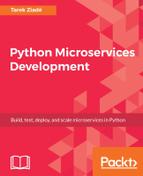Product desciption
Python Microservices Development Ziad Tarek by Ziadé, Tarek instant download after payment.
Key Features A very useful guide for Python developers who are shifting to the
new microservices-based development A concise, up-to-date guide to building
efficient and lightweight microservices in Python using Flask, Tox, and other
tools Learn to use Docker containers, CoreOS, and Amazon Web Services to
deploy your services Book Description
We often deploy our web applications into the cloud, and our code needs to
interact with many third-party services. An efficient way to build
applications to do this is through microservices architecture. But, in
practice, it's hard to get this right due to the complexity of all the pieces
interacting with each other.
This book will teach you how to overcome these issues and craft applications
that are built as small standard units, using all the proven best practices
and avoiding the usual traps. It's a practical book: you'll build everything
using Python 3 and its amazing tooling ecosystem. You will understand the
principles of TDD and apply them.
You will use Flask, Tox, and other tools to build your services using best
practices. You will learn how to secure connections between services, and how
to script Nginx using Lua to build web application firewall features such as
rate limiting. You will also familiarize yourself with Docker's role in
microservices, and use Docker containers, CoreOS, and Amazon Web Services to
deploy your services.
This book will take you on a journey, ending with the creation of a complete
Python application based on microservices. By the end of the book, you will be
well versed with the fundamentals of building, designing, testing, and
deploying your Python microservices.
What you will learn Explore what microservices are and how to design them Use
Python 3, Flask, Tox, and other tools to build your services using best
practices Learn how to use a TDD approach Discover how to document your
microservices Configure and package your code in the best way Interact with
other services Secure, monitor, and scale your services Deploy your services
in Docker containers, CoreOS, and Amazon Web Services About the Author
**Tarek Ziade** is a Python developer, located in the countryside near Dijon,
France. He works at Mozilla in the services team. He founded a French Python
user group called Afpy, and he has written several books about Python in
French and English. When he is not hacking on his computer or hanging out with
his family, he's spending time between his two passions, running and playing
the trumpet.
You can visit his personal blog (Fetchez le Python) and follow him on Twitter
(@tarek_ziade). You can also take a look at one of his books on Amazon, Expert
Python Programming, published by Packt.
Table of Contents Understanding Microservices Working with flask Test-driven
development and documentation, the virtuous cycle Designing Forrest
Interacting with other services Monitoring your services Securing your
services Consuming the Microservices Packaging Forrest Dockerizing your
services Deploying on AWS Thinking ahead
words : 78810


